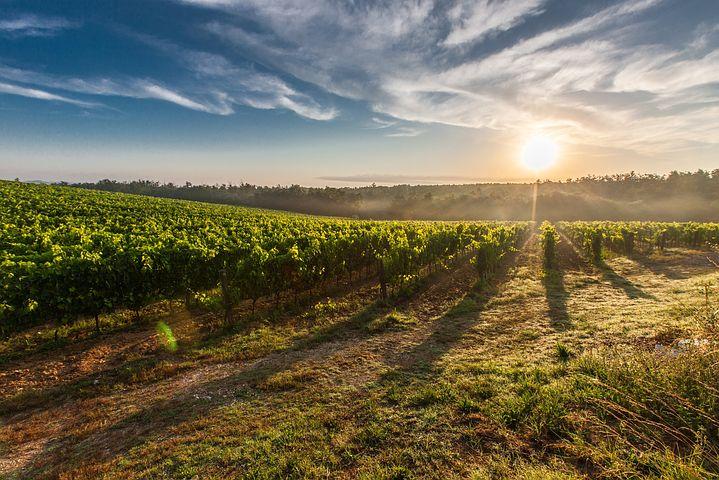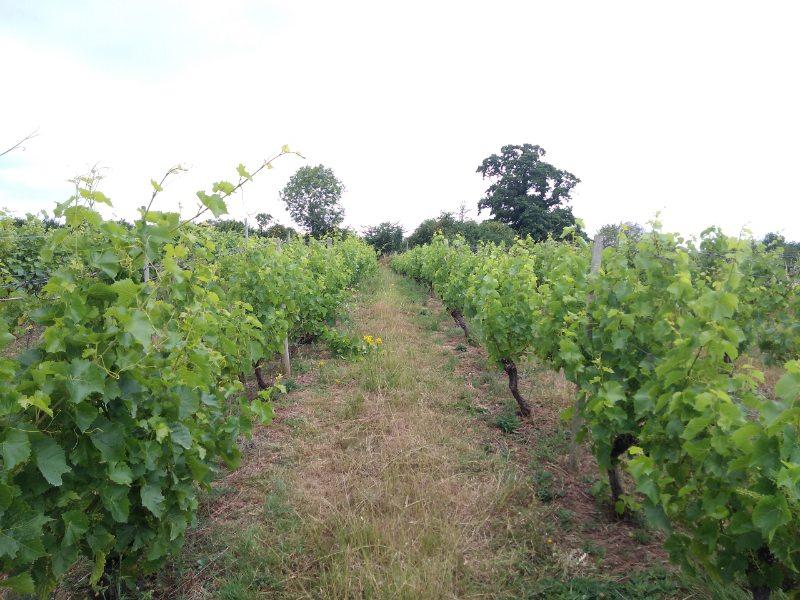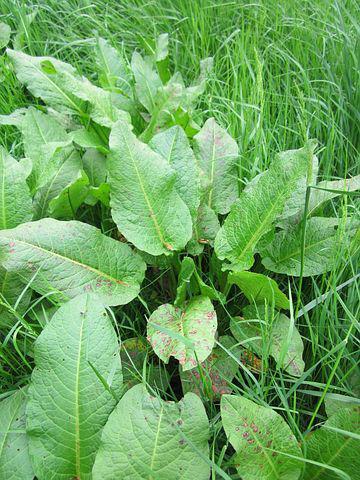
Welcome, dear readers, to another month of taking metta off the meditation cushion and out into the world.
A rule of thumb in winemaking is that grapes grow best within 30 and 50 degrees north or south of the Equator. Beyond those latitudes is generally considered too hot or too cool for the grapes to thrive. So this waitress-turned-farmhand for the summer was intrigued to explore what was happening at 51 degrees north and beyond.
Last month, “Metta Clears a Path” chronicled my latest placement volunteering on organic farms, which felt more like attending forest school than farming. This month found me helping a small family-run vineyard.
After having been the only volunteer at two placements and one of a 20+ army at another, I was excited to discover that a handful of other volunteers would be overlapping during my own stay.
On arrival, I quickly unpacked and joined our host and another new volunteer to tour the property. We discussed what needed to be done in the next few weeks, worked out a schedule to share routine tasks, and enjoyed a delicious communal meal prepared with amazing organic produce from the family’s fruit and vegetable garden.
Imagine my surprise when—during the first conversation with the fellow volunteer I would be sharing living quarters with above the vineyard’s wine shop for the next month—I realized that we’d both stayed at the troubled smallholding I described in “Metta Goes Free Range”! In fact, I had “replaced” them in April after they had left early at the end of March. Although I’d already made peace with the experience, it felt validating to share impressions and compare notes of how we’d each handled a difficult situation.
It felt rather poetic that our first working day was spent removing bitter dock from the home orchard meadow before it was mown for hay. Dock is an extremely invasive species with aggressive roots, so to glean (harvest) it you have to cut it down to the root and burn it before it goes to seed and takes over everything.
Bringing wheelbarrow after wheelbarrow to the bonfire that day as I took in my new surroundings was satisfying work. But something niggled at me. With a month’s hindsight, I was now able to recognize what was the first of many red flags that all was not well with my new work- and housemate.
After our initial chat, my co-volunteer stopped making eye contact and declined to eat at the same table or answer when I offered a friendly hello or smile during the course of our day. Truth be told, it was almost as if all the bitterness from my first placement had grown aggressive roots and was resurfacing to invade my latest.
At first, I reassured myself that our conversation had simply stirred up lingering emotions while we learned to sow, nurture, and harvest the plants that were welcome in the fruit and vegtable garden, glasshouses, and poly tunnel, according to the biodynamic calendar.

As the moon moves through its monthly cycle of waxing and waning, it also moves through the 12 zodiac constellations associated with each of the four elements: earth, water, air, and fire. Three constellations are connected with each element:
Earth = Taurus, Virgo, and Capricorn
Water = Cancer, Scorpio, and Pisces
Air = Gemini, Libra, and Aquarius
Fire = Aries, Leo, and Sagittarius
This in turn relates to parts of the plant:
Earth = root
Water = leaves
Air = flower
Fire = fruit
As an astrology enthusiast myself, I was delighted to learn more about this correlation and that there was even an app to help our host decide what to sow, plant, nurture, or harvest on a given day. Interestingly, family dinner-table conversations outside under the stars soon gave rise to discussions about the zodiac, and before long, a fellow volunteer and I were happily looking up and interpreting everyone’s natal charts for them.
That is with the exception of my housemate, who was slowly waning by no longer joining us for meals, randomly wandering off during work, and—after our arrival conversation—only rarely speaking to me anymore except to make the occasional bitter remark about the place and its people. I gave them every benefit of the doubt that I could think of, but a week into their slow withdrawal, they burst out in the middle of gardening one morning to accuse me of being invasive!
I immediately apologized for any harm I may have caused. I explained that it was never my intention to upset or invade anyone’s space, and asked for instances of when they felt I had been invasive. Not starting the interpersonal bonfire they were hoping to ignite left them too speechless to provide any concrete examples, and I calmly gave them permission to point out any future invasions as they were happening so that I could adjust my behavior accordingly. To satisfy my curiosity, I discreetly double-checked with our host while washing dishes that evening whether my housemate had perhaps been promised our shared accommodation as private, and they assured me that was not the case. So I determined to put down roots for the month to see what bore fruit in this new growing cycle.

The UK’s wine industry is one of the youngest in the world because of its northerly latitude. For example, cooler temperatures with less sunlight produce paler grapes than elsewhere. This means that a traditional red grape variety such as Pinot Noir, grown beyond 50 degrees north of the Equator, will produce a wine that still tastes like a red with closed eyes but looks like a rosé with open eyes. Compared with warmer climates and more established winemaking methods elsewhere, an emerging industry leaves more room for taking risks with new sustainability practices from how grapes are grown to how wine is eventually produced and distributed.
Charcoal is often used medically to detoxify the body after a narcotic overdose or other exposure to toxicity. Charcoal can also be inoculated with nutrients to create a kind of slow-release fertilizer called biochar that improves soils organically. My host is taking part in a biochar study, and some vines in the vineyard have inoculated biochar buried at their roots, while control vines are left to grow under normal conditions. It’s a long-term sustainability experiment, and they only expect to see changes in growth and yield metrics after two or more years.
Similarly, our meditation practice requires a long-game sustainability experiment mindset.
As I sat with my housemate’s increasingly toxic behaviors and the improbable odds of our crossing paths just three months into this new free-range chapter of my life (to put this into perspective, dear readers, there are more than 400 possible placements at any one time here in the UK) amid daily nationwide reports of fires and heatwaves, I comforted myself with the thought that perhaps I hadn’t been planted here to absorb more of April’s bitterness, but instead to infuse it with more metta? Perhaps the next level up from black-belt was a trial-by-fire biochar-belt?
Whenever my housemate tried to start another interpersonal bonfire, whether in the form of unkind comments or hostile silences or playing the team against each other or outright lying to our host family, I silently thanked them for giving me a chance to slow-release more metta in the form of greater self-care or compliments or rallying the team or greater transparency.
One telling moment took place in the communal kitchen when my housemate deliberately tried to bait me into an argument, presumably to relieve whatever sour grapes were still fermenting inside them. I just smiled, silently blessed them, and went about my business. They then actually yelled: “How can you stay so calm?!?” I just carried on washing dishes until they stormed out.

What saddened me most was the insidious ways in which they sowed the seeds of self-doubt in those around us, not unlike the scheming Iago in Shakespeare’s Othello. One by one, I would catch our coworkers or host family members alone asking themselves some version of “have I done something wrong?” to which I would firmly respond “no” and point out one of their many strengths or talents or recent accomplishments.
On our first day working in the actual vineyard to help prune and tuck in the vines—this opens up the canopy to more sunlight and ensures that the vines won’t become tangled up in any passing tractors or mowers—we worked in silence on either side of a row. My housemate cast me the occasional dirty look, which I returned with a smile and a silent blessing. After an hour or so, they drifted off as I continued to work on my side.
Before long, a local vintner who helps out part-time appeared in their place, asking what had happened to my friend. I shrugged my shoulders and confessed that I had no idea on any level. He chuckled that some people just weren’t cut out for how meditative working with grapevines was. It was my turn to chuckle from the other side of the row we were working on at the wisdom of his observation, and I asked if the vines ever spoke to him too, as I could practically feel what they were wanting me to do to help them thrive? He grinned, told me to keep the secret as vines only spoke to some, and confessed that he considered vineyards his church.
I won’t pretend that it’s been an easy month allowing metta to work through me to prune and tuck in against all kinds of bitterness, but taking a long-game experimental approach has helped to sweeten it.
On the final day of my housemate’s month-long stay, they came downstairs as I was preparing my breakfast and sat in hostile silence until I turned around to wish them a good morning. “Finally, you’re showing your true colors! You’re pure evil and a witch!” I honestly had to suppress a giggle at how beyond the pale their bitterness had become and give them some latitude with a sweet response: “I wish you well. Do you need help with your baggage?”
They actually yelled, “I hope I never see you again!”
At least that we could agree on, and I went for a long walk to open myself up to more sunlight and to enjoy not becoming tangled up in any further bitterness.
And so, dear readers, whatever bittersweet dynamics you may be facing in your own life as scorching heat of all kinds increases, please remember to give yourselves the latitude to slow-release metta wherever possible.
Or, to metta-morphose the Grapes of Wrath song “Peace of Mind:”
Coming over mountains
That pale beside the wall between us now
Since I refuse to play aloneEach day I see a ball and chain
Grow a little more engrained
And watch your corner pain
Saying nothing, nothing’s gonna changeMay metta find your peace of mind
Your peace of mind
Your peace of mind
Related features from BDG
Metta Clears a Path
The Soul of Soil: A Portrait of Frith Farm
Every Choice Is a Mistake
Kinks in the Garden Hose














